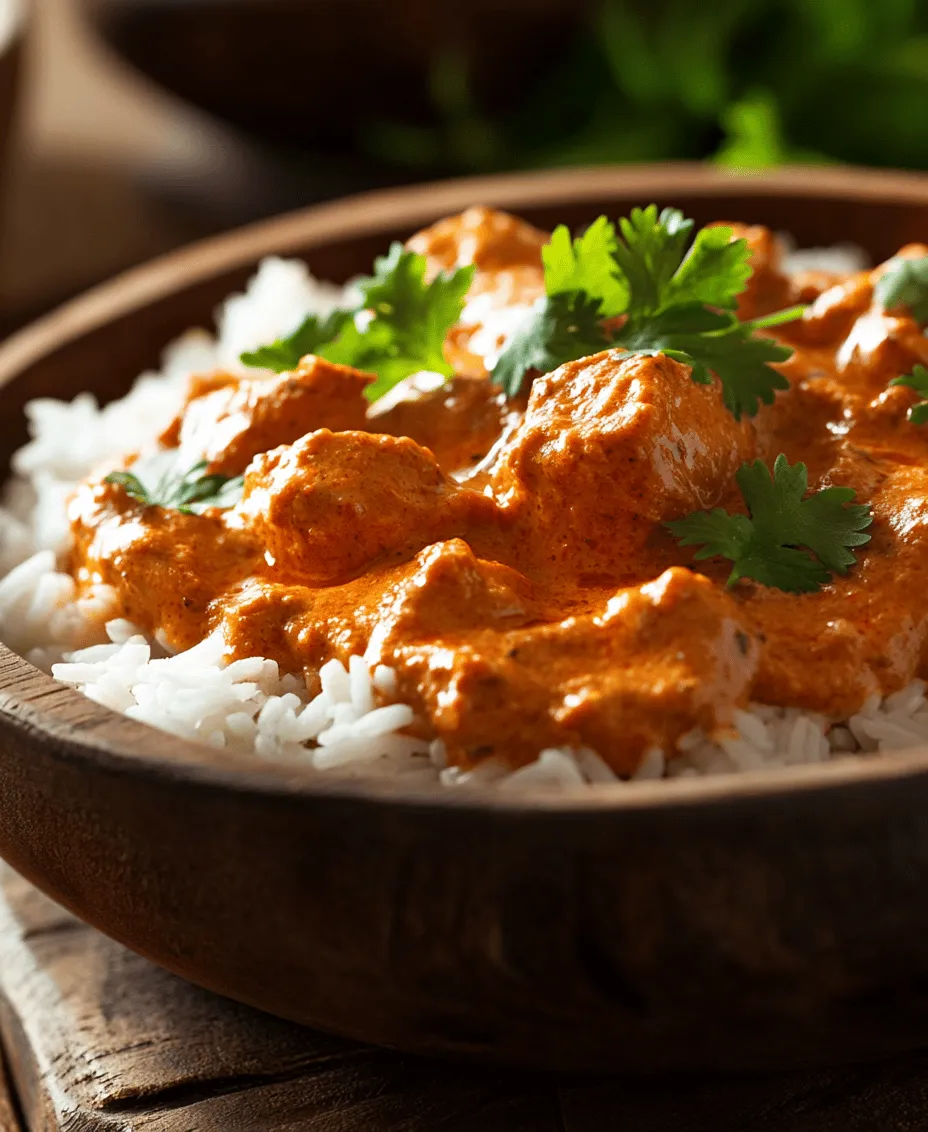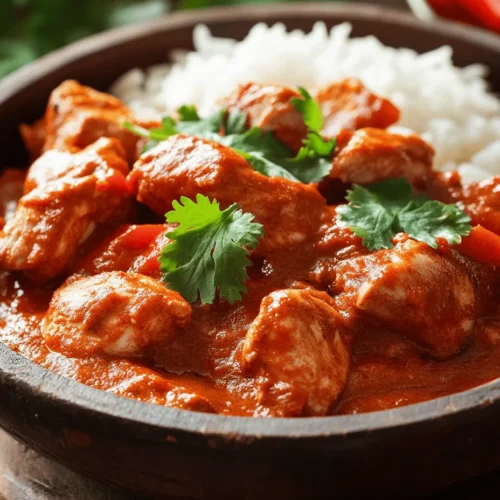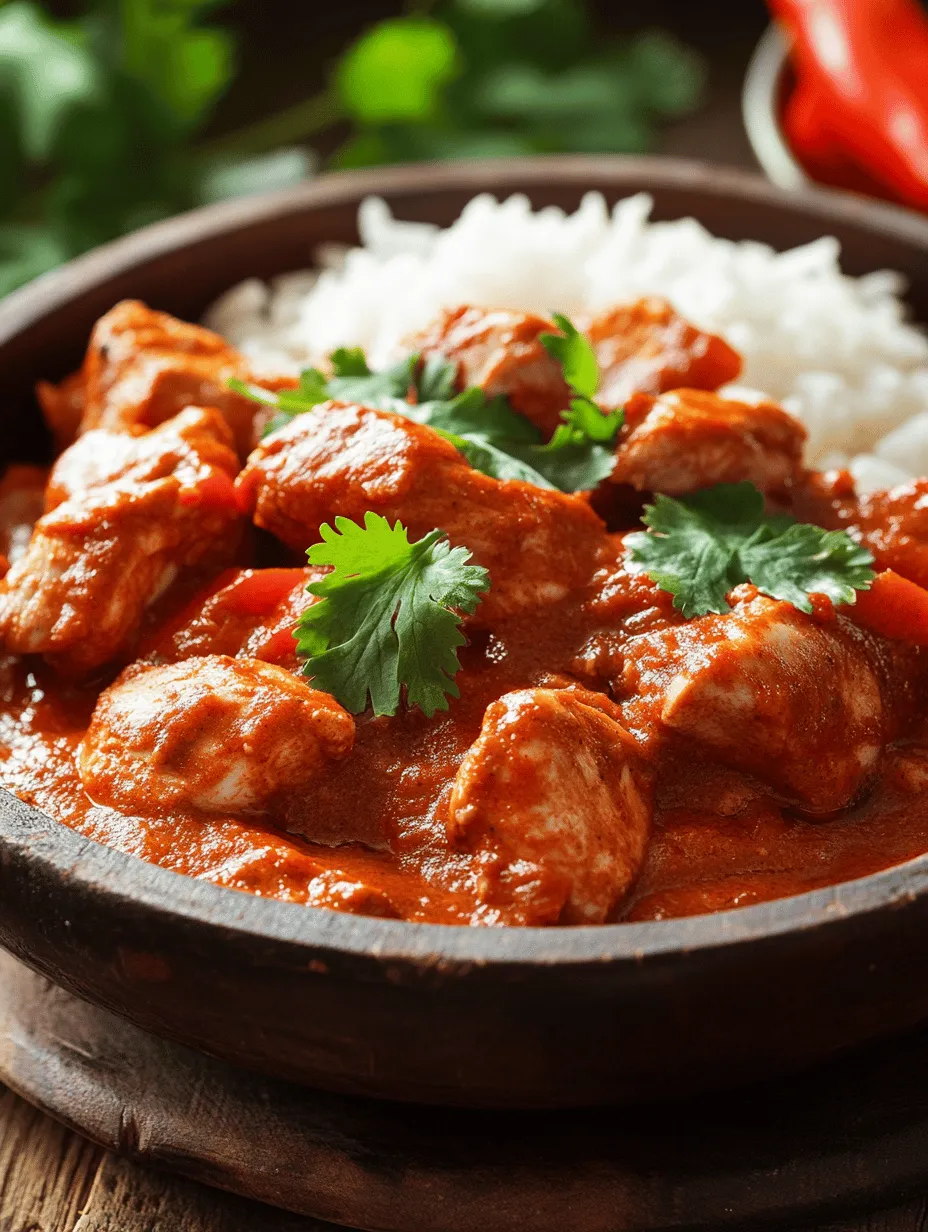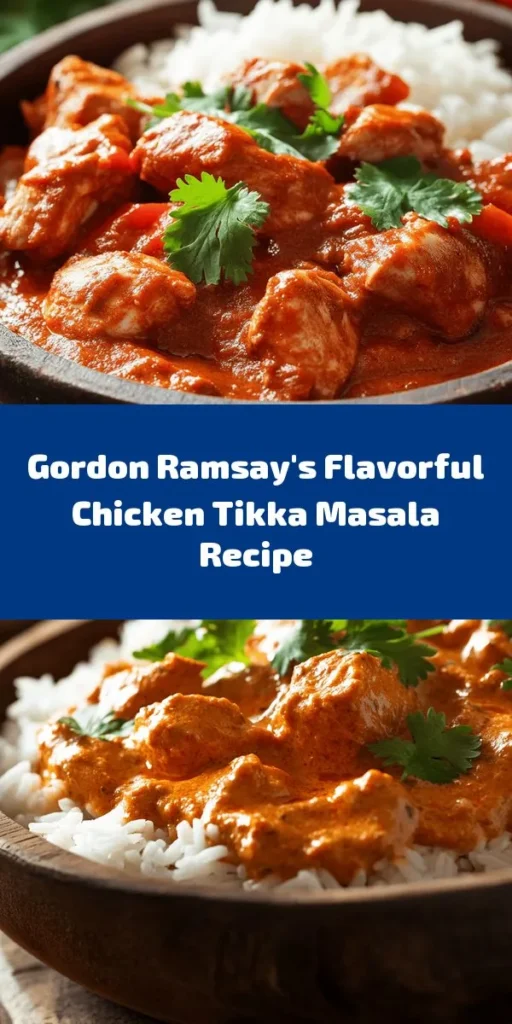Dive into the vibrant world of Indian cuisine with Gordon Ramsay’s Chicken Tikka Masala, a dish that beautifully blends aromatic spices, creamy textures, and tender chicken. Beloved by many, this recipe captures the essence of traditional Indian cooking while showcasing Ramsay’s expert culinary techniques. Known for his precise methods and rich flavor profiles, Ramsay elevates the classic Chicken Tikka Masala into a dish that is both accessible and indulgent. This article will guide you through each step of creating this flavorful dish, ensuring you can impress family and friends with your cooking prowess. Whether you are a seasoned cook or a beginner in the kitchen, this Chicken Tikka Masala recipe is designed to be approachable yet rewarding.
Understanding Chicken Tikka Masala
Exploring the Origins of Chicken Tikka Masala
Chicken Tikka Masala is not just a dish; it is a culinary phenomenon that has captured the hearts of food lovers globally. Its origins are somewhat debated, with various stories attributing its creation to different places and cultures. Many believe that Chicken Tikka Masala was born in the Indian subcontinent, particularly as a result of the cultural exchanges that occurred during British colonial rule. The fusion of Indian spices and British culinary preferences has led to this iconic dish’s emergence, marking it as a symbol of the culinary fusion that defines modern British cuisine.
Culturally, Chicken Tikka Masala holds a significant place in both Indian and British culinary traditions. In India, the dish reflects the rich tapestry of flavors and techniques that characterize regional cooking, while in the UK, it has become a staple of Indian restaurants, often hailed as the nation’s favorite dish. Its creamy sauce and tender chicken pieces appeal to a wide variety of palates, transcending cultural boundaries and inviting everyone to enjoy its delightful taste.
Variations of Chicken Tikka Masala Around the World
As Chicken Tikka Masala traveled beyond India, it underwent various adaptations, each region infusing its unique flavors and cooking techniques. In the United Kingdom, for instance, you might find versions that incorporate additional ingredients like coconut milk or different spices, reflecting local preferences. In the United States, chefs often experiment with the recipe, adding a touch of heat or using alternative proteins like shrimp or tofu to cater to different dietary needs.
Despite these variations, the essence of Chicken Tikka Masala remains the same: juicy, marinated chicken pieces coated in a rich, flavorful sauce that balances spices and creaminess. This versatility and adaptability have contributed to its widespread popularity, making it a beloved dish in homes and restaurants around the world.
The Appeal of Chicken Tikka Masala
So what makes Chicken Tikka Masala such a favorite among food lovers? The answer lies in its perfect balance of flavors and textures. The marinated chicken, often grilled or roasted for that smoky flavor, is enveloped in a velvety sauce that combines the warmth of spices with the cooling effects of cream. This harmonious blend creates a dish that is both comforting and sophisticated, making it suitable for casual dinners or festive gatherings.
Furthermore, the versatility of Chicken Tikka Masala allows it to pair beautifully with a variety of sides, from fluffy basmati rice to warm naan bread, making it a complete meal that satisfies any craving. Each bite offers a symphony of taste, with the spices awakening the palate while the creaminess soothes it, ensuring that this dish remains a perennial favorite across various culinary landscapes.
Ingredients Breakdown
Essential Ingredients for the Chicken Marinade
To achieve the depth of flavor that characterizes Gordon Ramsay’s Chicken Tikka Masala, the marinade is crucial. The primary component of the marinade is yogurt, which is essential for tenderizing the chicken while infusing it with flavor. The acidity in yogurt helps break down the proteins, ensuring that the chicken remains juicy and succulent after cooking.
The spices used in the marinade—garam masala, cumin, and coriander—are vital for establishing the flavor profile. Garam masala, a quintessential Indian spice blend, combines warm spices like cinnamon, nutmeg, and cardamom, creating a complex flavor base. Cumin adds an earthy aroma, while coriander brings a light, citrusy note that brightens up the dish. Together, these spices not only flavor the chicken but also contribute to the dish’s aromatic appeal.
Lemon juice is another key ingredient in the marinade. Its acidity enhances the overall flavor while helping to tenderize the chicken further. This combination of yogurt, spices, and lemon juice creates a marinade that penetrates the meat, ensuring that every bite is bursting with flavor.
Key Ingredients for the Sauce
While the chicken marinade sets the stage, the sauce is where the magic truly happens. The foundation of the sauce consists of aromatics: onion, garlic, and ginger. These ingredients are sautéed to create a fragrant base, releasing their natural oils and flavors that serve as the backbone of the dish. The onion adds sweetness, while garlic and ginger provide a robust flavor that enhances the overall profile.
A critical component of the sauce is the creamy element, which is typically heavy cream. The cream not only contributes to the dish’s luxurious texture but also mellows the spices, balancing the heat and acidity. For those looking for a lighter alternative, coconut milk can be used, imparting a slightly different flavor while maintaining that creamy consistency.
Tomatoes also play a significant role in the sauce, providing acidity and natural sweetness. Whether using fresh tomatoes or tomato puree, they contribute to the sauce’s vibrant color and flavor profile, ensuring that the Chicken Tikka Masala is not only delicious but visually appealing as well.
Step-by-Step Cooking Instructions
Preparing the Chicken Marinade
To begin your culinary journey into Gordon Ramsay’s Chicken Tikka Masala, start by preparing the chicken marinade. This step is crucial for developing the depth of flavor that defines this dish. Here’s how you can effectively prepare the marinade:
1. Select Your Chicken: Begin with boneless, skinless chicken thighs or breasts, as both options work well for this recipe. Thighs are often preferred for their juiciness, but breasts can provide a leaner alternative.
2. Create the Marinade: In a mixing bowl, combine plain yogurt, the juice of one lemon, garam masala, cumin, coriander, and a pinch of salt. The yogurt will act as the base, while the spices will infuse the chicken with robust flavors. Mix until you have a smooth consistency.
3. Marinate the Chicken: Cut the chicken into bite-sized pieces and add them to the marinade, ensuring they are well coated. For the best results, cover the bowl with plastic wrap and refrigerate for at least one hour, but ideally overnight. This allows the flavors to penetrate the chicken, resulting in a more flavorful dish.
4. Preheat Your Cooking Surface: While the chicken marinates, preheat your grill or oven. If you’re using a grill, aim for a medium-high temperature to achieve that perfect char. If you’re baking, preheat your oven to 400°F (200°C).
By following these initial steps, you will set a strong foundation for creating an authentic and flavorful Chicken Tikka Masala, ensuring that each bite is infused with the rich spices and creamy textures that make this dish so beloved. As you continue through the cooking process, keep in mind that patience and attention to detail will yield the best results, allowing you to deliver a dish that not only satisfies the palate but also impresses your guests.
Stay tuned for the next part, where we’ll explore the cooking process in detail and guide you through the preparation of the sauce, ensuring that your Chicken Tikka Masala is nothing short of spectacular.

Importance of Marination Time
Marination is a crucial step in preparing Gordon Ramsay’s Chicken Tikka Masala, as it significantly enhances the flavor and tenderness of the chicken. Allowing the chicken to marinate for at least 2 hours, or ideally overnight, enables the spices and yogurt to penetrate the meat thoroughly. This not only infuses the chicken with aromatic flavors but also helps tenderize it, resulting in a juicy, succulent texture after cooking. If you’re short on time, even a 30-minute marination can yield decent results, but for the best experience, patience is key.
Tips for Ensuring Even Coating of Chicken Pieces
To achieve an even coating of the marinade on the chicken, follow these simple tips:
1. Cut Uniformly: Ensure that the chicken pieces are cut into similar sizes, ideally about 1 to 1.5 inches. This not only ensures even cooking but also allows for uniform absorption of the marinade.
2. Use a Sealable Bag: Instead of a bowl, consider using a large resealable plastic bag for marinating. This allows you to massage the marinade into the chicken, ensuring that every piece is well-coated.
3. Air Out the Bag: When sealing the bag, push out as much air as possible before sealing. This helps the marinade cling to the chicken pieces better.
4. Turn Occasionally: If marinating in a bowl, stir the chicken every so often to ensure that all pieces are equally coated with the marinade.
Cooking the Chicken
Techniques for Grilling Chicken Perfectly
To achieve tender, flavorful chicken, grilling is an excellent method. Here are some techniques to keep in mind:
1. Preheat Your Grill: Ensure your grill is hot before placing the chicken on it. A preheated grill helps to sear the chicken immediately, locking in moisture and flavor.
2. Oil the Grill Grate: Lightly oil the grill grates before cooking to prevent sticking. This ensures that the chicken can be easily turned without tearing.
3. Use Indirect Heat: After searing the chicken on high heat for a few minutes, move it to a cooler part of the grill to finish cooking through. This method prevents the outside from burning while the inside remains raw.
4. Check Doneness: Use a meat thermometer to check if the chicken has reached an internal temperature of 165°F (75°C). This ensures it is fully cooked while remaining juicy.
Achieving the Desired Char and Flavor
For that authentic char and smoky flavor reminiscent of traditional tandoori chicken, follow these tips:
1. Don’t Overcrowd the Grill: Give each piece space on the grill to allow for proper airflow and even cooking. Overcrowding can cause steaming instead of grilling, hindering the desired char.
2. Baste with Yogurt: While grilling, you can occasionally baste the chicken with leftover marinade or a mixture of yogurt and spices. This adds more flavor and moisture, creating a delicious crust.
3. Time it Right: Grill the chicken for about 5-7 minutes on each side, depending on the thickness. Keep an eye on it to prevent overcooking.
Creating the Sauce
Sautéing Techniques for Onions and How to Achieve the Golden Color
The sauce for Chicken Tikka Masala is the heart of the dish, and properly sautéed onions lay the foundation. Here’s how to achieve that perfect golden color:
1. Use Ghee or Oil: Start by heating ghee or vegetable oil in a large skillet over medium heat. Ghee adds richness and an authentic flavor, but you can use oil if preferred.
2. Add Onions Gradually: Introduce finely chopped onions to the hot oil. Stir frequently to avoid burning, as burnt onions can impart a bitter taste.
3. Low and Slow: Cook the onions slowly over medium heat for about 10-15 minutes until they turn a deep golden brown. Patience is key here; rushing the process can lead to uneven cooking.
Adding Spices: When and How to Incorporate Them for Maximum Flavor
Building the flavor profile of your sauce relies on the timing and technique of spice incorporation:
1. Toast Whole Spices: If using whole spices like cumin and coriander seeds, add them to the pan after the onions are golden. Toasting them for a minute until fragrant releases essential oils, enhancing the dish’s flavor.
2. Add Ground Spices: Once the whole spices are aromatic, add ground spices like garam masala, turmeric, and chili powder. Cooking them for an additional minute allows their flavors to bloom.
3. Incorporate Garlic and Ginger: After the spices are toasted, stir in minced garlic and ginger. Sauté for about 30 seconds until fragrant; be careful not to let them burn.
The Process of Simmering Tomatoes to Build Depth
Tomatoes are the backbone of the sauce, and simmering them properly is essential for developing depth:
1. Add Pureed Tomatoes: After sautéing the aromatics, pour in crushed or pureed tomatoes. You can use canned tomatoes for convenience or fresh ones for a vibrant flavor.
2. Simmer and Reduce: Bring the mixture to a gentle simmer and let it cook for about 15-20 minutes. This allows the tomatoes to break down and meld with the spices, creating a rich sauce.
3. Balance Flavors: Taste the sauce during simmering and adjust the seasoning with salt and sugar to balance acidity. A pinch of sugar can help brighten the flavors.
Combining Chicken and Sauce
Techniques for Ensuring Chicken is Fully Coated with Sauce
Once your chicken is grilled and your sauce is bubbling, it’s time to bring them together:
1. Cut Chicken into Pieces: If desired, cut the grilled chicken into bite-sized pieces for easier serving and better sauce absorption.
2. Add Chicken to Sauce: Gently fold the chicken into the simmering sauce, ensuring each piece is well-coated. Allow the chicken to simmer in the sauce for an additional 5-10 minutes to absorb the flavors.
3. Adjust Consistency: If the sauce is too thick, you can add a splash of water or chicken stock to reach your desired consistency.
Adjusting Seasoning and Consistency to Preference
Final touches are essential for a well-balanced dish:
1. Taste Test: Always taste the sauce before serving. Adjust seasoning with salt, pepper, or additional spices as needed.
2. Cream or Yogurt Addition: For a creamier texture, stir in a splash of heavy cream or a dollop of yogurt just before serving. This not only enhances the richness but also tempers the heat from the spices.
Serving Suggestions
Perfect Pairings for Chicken Tikka Masala
Chicken Tikka Masala is versatile and pairs beautifully with various accompaniments:
1. Traditional Accompaniments: Serve your Chicken Tikka Masala with fluffy basmati rice and warm naan bread. The rice absorbs the delicious sauce, while naan is perfect for scooping up the dish.
2. Creative Side Dish Ideas: Consider adding a side of cucumber raita for a cooling effect, or a fresh salad to balance the richness of the dish. Roasted vegetables or a simple lentil dal can also complement the meal well.
Garnishing for Presentation
A visually appealing dish enhances the dining experience, and garnishing plays a pivotal role:
1. The Importance of Fresh Coriander: Chopped fresh coriander (cilantro) adds a burst of color and freshness. Sprinkle it liberally over the Chicken Tikka Masala just before serving.
2. Tips for Plating the Dish Attractively: Serve the Chicken Tikka Masala in a deep bowl or a rustic plate. Drizzle a little cream or yogurt on top in a swirl pattern for an elegant touch. Include a wedge of lemon on the side for an extra zesty flavor.
Conclusion
Gordon Ramsay’s Chicken Tikka Masala is not just a meal; it’s an experience that brings the warmth and richness of Indian cuisine into your home. With its complex flavors and creamy sauce, this dish is perfect for any occasion, whether a casual family dinner or a festive gathering. By following this detailed recipe and understanding the components that make it special, you can create a dish that not only satisfies the palate but also showcases your culinary skills. Embrace the art of cooking and enjoy the delightful journey of preparing this beloved classic. With practice and passion, you’ll soon master this recipe and impress your family and friends with your culinary prowess.



